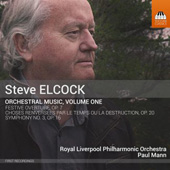

Symphony No. 3, Op. 16
Choses renversées par le temps ou la destruction, Op. 20
Festive Overture, Op. 7
"I was born in Chesterfield, Derbyshire, in 1957 and studied at the local grammar
school, where I obtained an A Level in music and learnt the violin up to grade 7.
These are my only musical qualifications: as a composer I am otherwise self-taught.
I began writing around age fifteen and have continued to do so ever since. In 1981
I moved to France, where I work in language services for companies. For a period
of about ten years, I conducted the local amateur symphony orchestra, which played
some of my early compositions." {Steve Elcock}
I don't know about you, but when I read autobiographical comments like this I tend to assume that this composer's music is either conservative and traditional in nature, replicating proven and
established styles, or is so out of touch and far out in left field that it only makes any logical sense to the composer himself. Instead, what I hear from a composer who didn't witness the first
professional performance of one of his pieces until he was 52, is the hard work of an artist who's absorbed all the raw energy and emotional turmoil evident within the last century of music and
forged it into his own highly personal style without succumbing to fads and/or failing to see the final outcome, the audience. It doesn't adhere to any specific rules or follow any preset formulas,
but instead grows and develops in a highly organic manner, and in that sense reminds me of the orchestral music of Carson Cooman
but inflicted with frenzied despair and a keen sense of life's larger machinations. The Toccata Classics liner notes suggest that he "has evolved a compelling symphonic style entirely his own,
which combines virtuoso orchestral writing with a sense of momentum that has its roots in the Nordic-British tradition of Sibelius, Nielsen, Simpson, Brian and similar figures." And along
with that lofty lineage he doesn't try to impose on the listener a new cacophonous language, or paint an alien sonic landscape, but rather adds his own original and highly brilliant brush strokes
to a canvas framed by historical convention.
Within the opening movement alone of the Symphony No. 3, Op. 16 you are subjected to large swathes of intensely energetic outbursts strewn with moments of
bleak and desolate imagery that still haunt the mind long after audition. On the other hand, the almost American swagger of the Festive Overture, Op. 7, with
its proud fanfares and highly charged momentum, displays a more rhapsodic and jovial side of the composer. And I may be imagining things, but starting at the 1:00 mark of Last
Man Standing, the final segment of Choses renversées par le temps ou la destruction (Things knocked down by time or destruction), I can hear,
embedded within the orchestral textures, what sounds like whiffs of one of the main themes from Shostakovich's 5th Symphony. Is this possibly Steve Elcock's way of pointing out that Shostakovich
was the last great symphonist? Or maybe I just need my head examined ....
I highly recommend the music of Steve Elcock to all of you out there still fascinated and enthralled by solid symphonic writing, something that we simply cannot allow to be
knocked down by time or destruction.
Jean-Yves Duperron - September 2017